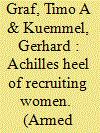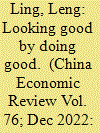|
|
|
Sort Order |
|
|
|
Items / Page
|
|
|
|
|
|
|
| Srl | Item |
| 1 |
ID:
187111


|
|
|
|
|
| Summary/Abstract |
The German Bundeswehr, like other NATO forces, seeks to recruit more women in order to improve its gender balance and to meet its personnel needs. However, previous research on military recruitment has paid little attention to women. Given that the (German) military is still a male-dominated organization, we argue that women’s opinion regarding the realization of gender equality in the military may very well be the Achilles heel of recruiting women. Based on the assumption that women value gender equality in the work environment, we test the hypothesis that women are more attracted to the military as a (potential) employer, the more they think the military has achieved gender equality. A multivariate analysis of nationally representative survey data from Germany from 2019 provides empirical evidence to support this hypothesis. Practical and theoretical implications are discussed.
|
|
|
|
|
|
|
|
|
|
|
|
|
|
|
|
| 2 |
ID:
175318


|
|
|
|
|
| Summary/Abstract |
This paper seeks to revisit the narratives surrounding China and Africa relations. While these engagements have attracted the attention of scholars and policymakers, the emphasis has been on the economic aspects and a little attention has been made to examine the role of non-economic drivers. This paper argues that even though economic drivers are significant, Africa and China relations go beyond economic drivers. It identifies non-economic factors like the personality of president Xi Jinping and his personalised relations with African leaders, perceived attitudes of Western countries towards the continent, China’s political system, politics of mega projects in Africa, China’s soft power strategies and historical experiences as significant factors in strengthening relations between Beijing and the continent. It looks at attractiveness as an important concept in understanding states’ actions and relations. The paper concludes that engagements between China and Africa maybe characterised by huge economic factors, but the foundation of these relations is attractiveness anchored on a number of non-economic drivers.
|
|
|
|
|
|
|
|
|
|
|
|
|
|
|
|
| 3 |
ID:
190900


|
|
|
|
|
| Summary/Abstract |
In 2014, eight years prior to the Russian invasion of Ukraine in 2022, Russian-backed separatists seized parts of the Ukrainian regions Luhansk and Donetsk. Shortly thereafter, thousands of Ukrainians voluntarily enrolled to various paramilitary battalions. Unlike the Right Sector's Volunteer Ukrainian Corps (RS VUC), almost all battalions were incorporated into Ukrainian official defence structures. Applying uncertainty-identity theory and based on interviews, observations, and documents, this study investigates the attractiveness of RS VUC prior to the 2022 war, motivating the fighters to join this organisation and to remain in it. The study found that fighters of RS VUC distrusted society, the wider population, and state authorities. RS VUC, with its high fighting morale, discipline, family-like relationships between fighters, as well as its clear ideology and boundaries between ‘us’ and ‘them’, were attractive to the fighters since its unambiguous group prototypes and high entitativity, reduced the fighters’ self-uncertainty regarding their social identity in an uncertain environment. The findings also revealed that the fighters’ choice to join RS VUC can be understood as a rational decision, since RS VUC's group entitativity provided the fighters with moral and emotional benefits, as well as maximised their chances of survival.
|
|
|
|
|
|
|
|
|
|
|
|
|
|
|
|
| 4 |
ID:
187911


|
|
|
|
|
| Summary/Abstract |
We investigate the effect of male corporate managers' physical appearance—classified into unattractive, average-looking, and attractive—on the philanthropic decisions of Chinese listed firms. We find that compared to average-looking managers, those who rated as attractive do not engage more actively in corporate donations. On the contrary, the probability of donating is approximately 5% higher for unattractive managers than for average-looking managers; further, unattractive managers donate 95% more in charitable giving. To explain these findings, we propose a psychological channel through which physical appearance may influence male managers' charitable donations: Because altruistic behaviors may aggrandize individuals, managers conscious of deficits in their own physical attractiveness may engage in prosocial behavior to increase their attractiveness in the eyes of others. We find consistent evidence that the effect of managers' unattractiveness on philanthropic decisions is stronger in firms with weaker corporate governance; further, we find that the positive impact of corporate donation on financial performance observed in firms led by attractive and average-looking managers is substantially weaker in those firms led by unattractive managers
|
|
|
|
|
|
|
|
|
|
|
|
|
|
|
|
|
|
|
|
|